29.1.3.5 (29 > 11)
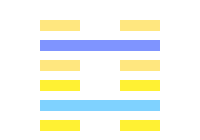
29.1.3.5 (29 > 11) - THE KHAN HEXAGRAM.
- 1. The first line, divided, shows its subject in the double defile, and (yet) entering a cavern within it. There will be evil.
- 3. The third line, divided, shows its subject, whether he comes or goes ( = descends or ascends), confronted by a defile. All is peril to him and unrest. (His endeavours) will lead him into the cavern of the pit. There should be no action (in such a case).
- 5. The fifth line, undivided, shows the water of the defile not yet full, (so that it might flow away) ; but order will (soon) be brought about. There will be no error.
29.1.3.5 (29 > 11) - Making false accusations
One accuses one's relatives of wrongdoing they could not commit.
Bing DeepL Google Yandex29.1.3.5 (29 > 11) - Making false accusations
One accuses one's relatives of wrongdoing they could not commit.
Bing DeepL Google Yandex29.1.3.5 (29 > 11) - K’ân, l’abîme
K’ān : danger, précipice, caverne. — Tsa k’ān : courir de grands risques ; s’exposer au danger pour un autre.
- 1. Courir des dangers, comme entrer dans une caverne d’un défilé dangereux, est chose redoutable.
- 3. Si en tout et partout on ne rencontre que danger, que les périls, les sujets de crainte s’accumulent, alors dans un tel danger, il n’y a plus d’expédient qui puisse servir. — Il n’y aura plus de secours possible.
- 5. Mais si le danger n’est pas inéluctable, si une caverne où l’on se trouve n’est point pleine d’eau et qu’on puisse encore aplanir le terrain, on en sortira sans faute. — Il n’arrivera pas malheur.
29.1.3.5 (29 > 11) - Lancer de fausses accusations
On accuse ses proches de méfaits qu'ils n'ont pas pu commettre.
Bing DeepL Google Yandex29.1.3.5 (29 > 11) - Mélység
- 1. Ha egy nehézséggel találkozott, meg kell oldania mielőtt elkezdene foglalkozni egy másikkal.
- 3. Látják amit elrontott így odébbáll.
- 5. Mielőtt visszatérne hogy segítsen másokon, szünetet kell tartania és fel kell készülnie hogy válaszoljon a közelállóknak.
The trigrams
The trigrams are combinations of three yin and yang lines. The three bottom lines of the hexagram form the lower trigram and represent the inner situation. The three top lines form the upper trigram and represent the outer situation.
Upper trigram: The water The earth


Lower trigram: The water The sky


The formation: 29
What is already there
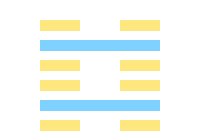
29 - THE KHAN HEXAGRAM.
Khan, here repeated, shows the possession of sincerity, through which the mind is penetrating. Action (in accordance with this) will be of high value.
Bing DeepL Google Yandex29 - K’ân, l’abîme
K’ān : danger, précipice, caverne. — Tsa k’ān : courir de grands risques ; s’exposer au danger pour un autre.
Texte
La droiture, le coeur fidèle et attaché, réussit ; ses actes ont de l’éclat s’il persévère malgré le danger.
Symbolisme
L’eau s’étendant au loin (deux fois eau) forme le Koua. Le sage, d’une vertu constante, agit vertueusement et s’applique à l’enseignement. Il répand ses biens comme l’eau.
Commentaire
Tsa k’ān est un danger grave. L’eau débordant, mais ne remplissant pas tout (que figure le Koua), représente les dangers courus sans qu’on perde sa fidélité constante. Le coeur attaché réussit ; quand la force garde le milieu, tout ce qu’on fait est bon et méritoire. Le ciel a ses dangers qu’on ne peut surmonter. La terre a les siens dans les montagnes, les fleuves et les ravins. Les rois et princes arrangent les choses dangereuses de manière à sauvegarder leurs États. Le moment du danger est bien grave.
29 - La profondeur
Quand les problèmes sont trop difficiles, on essaie de les contourner.
Bing DeepL Google Yandex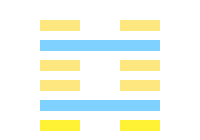
29.1 (29 > 60) - THE KHAN HEXAGRAM.
The first line, divided, shows its subject in the double defile, and (yet) entering a cavern within it. There will be evil.
Bing DeepL Google Yandex29.1 (29 > 60) - Dealing with problems in the right order
When one has encountered a difficulty, one must solve it before facing others.
Bing DeepL Google Yandex29.1 (29 > 60) - Dealing with problems in the right order
When one has encountered a difficulty, one must solve it before facing others.
Bing DeepL Google Yandex29.1 (29 > 60) - K’ân, l’abîme
K’ān : danger, précipice, caverne. — Tsa k’ān : courir de grands risques ; s’exposer au danger pour un autre.
Courir des dangers, comme entrer dans une caverne d’un défilé dangereux, est chose redoutable.
Bing DeepL Google Yandex29.1 (29 > 60) - Traiter les problèmes dans l'ordre
Quand on a rencontré une difficulté, on doit la résoudre avant d'en affronter d'autres.
Bing DeepL Google Yandex29.1 (29 > 60) - Mélység
Ha egy nehézséggel találkozott, meg kell oldania mielőtt elkezdene foglalkozni egy másikkal.
Bing DeepL Google Yandex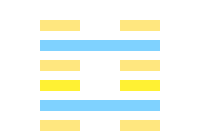
29.3 (29 > 48) - THE KHAN HEXAGRAM.
The third line, divided, shows its subject, whether he comes or goes ( = descends or ascends), confronted by a defile. All is peril to him and unrest. (His endeavours) will lead him into the cavern of the pit. There should be no action (in such a case).
Bing DeepL Google Yandex29.3 (29 > 48) - Leaving the field
Others notice what one has wasted, thus one leaves.
Bing DeepL Google Yandex29.3 (29 > 48) - Leaving the field
Others notice what one has wasted, thus one leaves.
Bing DeepL Google Yandex29.3 (29 > 48) - K’ân, l’abîme
K’ān : danger, précipice, caverne. — Tsa k’ān : courir de grands risques ; s’exposer au danger pour un autre.
Si en tout et partout on ne rencontre que danger, que les périls, les sujets de crainte s’accumulent, alors dans un tel danger, il n’y a plus d’expédient qui puisse servir. — Il n’y aura plus de secours possible.
Bing DeepL Google Yandex29.3 (29 > 48) - Abandonner le terrain
Les autres voient ce que l'on a gâché, alors on s'en va.
Bing DeepL Google Yandex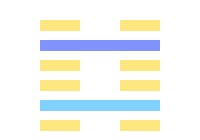
29.5 (29 > 7) - THE KHAN HEXAGRAM.
The fifth line, undivided, shows the water of the defile not yet full, (so that it might flow away) ; but order will (soon) be brought about. There will be no error.
Bing DeepL Google Yandex29.5 (29 > 7) - Going on vacation
Before returning to help others, one must take a break and prepare oneself to answer to one's relatives.
Bing DeepL Google Yandex29.5 (29 > 7) - Going on vacation
Before returning to help others, one must take a break and prepare oneself to answer to one's relatives.
Bing DeepL Google Yandex29.5 (29 > 7) - K’ân, l’abîme
K’ān : danger, précipice, caverne. — Tsa k’ān : courir de grands risques ; s’exposer au danger pour un autre.
Mais si le danger n’est pas inéluctable, si une caverne où l’on se trouve n’est point pleine d’eau et qu’on puisse encore aplanir le terrain, on en sortira sans faute. — Il n’arrivera pas malheur.
Bing DeepL Google Yandex29.5 (29 > 7) - Partir en congés
Avant de retourner aider les autres, on doit faire une pause et se préparer à répondre à ses proches.
Bing DeepL Google Yandex29.5 (29 > 7) - Mélység
Mielőtt visszatérne hogy segítsen másokon, szünetet kell tartania és fel kell készülnie hogy válaszoljon a közelállóknak.
Bing DeepL Google YandexIn the making: 11
What is poised to happen

11 - THE THÂI HEXAGRAM.
In Thâi (we see) the little gone and the great come. (It indicates that) there will be good fortune, with progress and success.
Bing DeepL Google Yandex11 - T’ai, la paix
T’ai : union, pénétration ; libéralité, générosité.
Texte
Le petit va au grand ; le grand va au petit ; de là heureux développement des choses. (La matière va à la force ; la terre au ciel ; les petits vont vers les grands.)
Symbolisme
T’ai exprime les rapports, la pénétration réciproque du ciel et de la terre. Le prince, par sa puissance, complète les actes réguliers du ciel et de la terre ; aidant, assistant leurs convenances, il soutient en même temps le peuple.
Commentaire
1. Quand cette pénétration réciproque s’opère, le ciel et la terre s’harmonisent et tous les êtres se produisent. Le haut et le bas s’harmonisent et leurs intentions et fins sont identiques.
2. Le trigramme inférieur représente le principe actif et le trigramme supérieur, le principe passif. Le premier figure la puissance constitutive et le grand ; le second représente la soumission, la réceptivité et le petit, l’homme vulgaire.
La voie du grand s’élève ; celle du petit est pleine de tristesse et silencieuse.
The nuclear hexagram: 27.2.4.6 (27 > 54)
The nuclear hexagram is the association of the two inner trigrams (lines 2,3,4 and 3,4,5). It represents the root, or the origin of the situation.
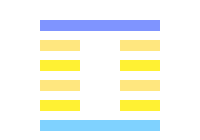
27.2.4.6 (27 > 54) - THE Î HEXAGRAM.
- 2. The second line, divided, shows one looking downwards for nourishment, which is contrary to what is proper ; or seeking it from the height (above), advance towards which will lead to evil.
- 4. The fourth line, divided, shows one looking downwards for (the power to) nourish. There will be good fortune. Looking with a tiger's downward unwavering glare, and with his desire that impels him to spring after spring, he will fall into no error.
- 6. The sixth line, undivided, shows him from whom comes the nourishing. His position is perilous, but there will be good fortune. It will be advantageous to cross the great stream.
27.2.4.6 (27 > 54) - Having allergies
One envies those who take pleasure in feeding themselves this way.
Bing DeepL Google Yandex27.2.4.6 (27 > 54) - Having allergies
One envies those who take pleasure in feeding themselves this way.
Bing DeepL Google Yandex27.2.4.6 (27 > 54) - I, l’alimentation
Ī : 1. Entretenir, soutenir ; 2. Menton, côté de la bouche ; 3. Profond.
- 2. Baisser le menton, c’est renverser les lois morales. Le lever vers les hauteurs, c’est aller au mal, au malheur. (Ces deux expressions désignent ceux qui font les parasites près des petits et près des grands — ou plutôt : ceux qui s’avilissent ou visent trop haut.)
- 4. Celui qui cherche la nourriture comme un tigre avançant pas à pas et regardant fixement, réussira en ses désirs.
-
6. Rechercher les moyens d’entretenir les hommes est une excellente chose quoique difficile ; elle réussira avantageusement (si l’on s’y applique).
On en retirera l’approbation universelle.
27.2.4.6 (27 > 54) - Avoir des allergies
On envie ceux qui prennent du plaisir à s'alimenter de la sorte.
Bing DeepL Google Yandex27.2.4.6 (27 > 54) - Ellátás
- 2. Nem keresi távol azt, amit megtalál a környezetében is.
- 4. Felméri a lehetőségeket.
- 6. Megvizsgálja mielőtt kielégítené az igényeket.
Ruler
The starting situation

29.5 (29 > 7) - THE KHAN HEXAGRAM.
The fifth line, undivided, shows the water of the defile not yet full, (so that it might flow away) ; but order will (soon) be brought about. There will be no error.
Bing DeepL Google Yandex29.5 (29 > 7) - Going on vacation
Before returning to help others, one must take a break and prepare oneself to answer to one's relatives.
Bing DeepL Google Yandex29.5 (29 > 7) - Going on vacation
Before returning to help others, one must take a break and prepare oneself to answer to one's relatives.
Bing DeepL Google Yandex29.5 (29 > 7) - K’ân, l’abîme
K’ān : danger, précipice, caverne. — Tsa k’ān : courir de grands risques ; s’exposer au danger pour un autre.
Mais si le danger n’est pas inéluctable, si une caverne où l’on se trouve n’est point pleine d’eau et qu’on puisse encore aplanir le terrain, on en sortira sans faute. — Il n’arrivera pas malheur.
Bing DeepL Google Yandex29.5 (29 > 7) - Partir en congés
Avant de retourner aider les autres, on doit faire une pause et se préparer à répondre à ses proches.
Bing DeepL Google Yandex29.5 (29 > 7) - Mélység
Mielőtt visszatérne hogy segítsen másokon, szünetet kell tartania és fel kell készülnie hogy válaszoljon a közelállóknak.
Bing DeepL Google YandexCorrection
The direction where the ruler is going to bend
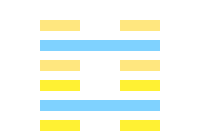
29.1.3 (29 > 5) - THE KHAN HEXAGRAM.
- 1. The first line, divided, shows its subject in the double defile, and (yet) entering a cavern within it. There will be evil.
- 3. The third line, divided, shows its subject, whether he comes or goes ( = descends or ascends), confronted by a defile. All is peril to him and unrest. (His endeavours) will lead him into the cavern of the pit. There should be no action (in such a case).
29.1.3 (29 > 5) - Repeating the demonstration
One presents facts that others have already experienced.
Bing DeepL Google Yandex29.1.3 (29 > 5) - Repeating the demonstration
One presents facts that others have already experienced.
Bing DeepL Google Yandex29.1.3 (29 > 5) - K’ân, l’abîme
K’ān : danger, précipice, caverne. — Tsa k’ān : courir de grands risques ; s’exposer au danger pour un autre.
- 1. Courir des dangers, comme entrer dans une caverne d’un défilé dangereux, est chose redoutable.
- 3. Si en tout et partout on ne rencontre que danger, que les périls, les sujets de crainte s’accumulent, alors dans un tel danger, il n’y a plus d’expédient qui puisse servir. — Il n’y aura plus de secours possible.
29.1.3 (29 > 5) - Refaire la démonstration
On présente des faits que les autres ont déjà expérimentés.
Bing DeepL Google Yandex29.1.3 (29 > 5) - Mélység
- 1. Ha egy nehézséggel találkozott, meg kell oldania mielőtt elkezdene foglalkozni egy másikkal.
- 3. Látják amit elrontott így odébbáll.

